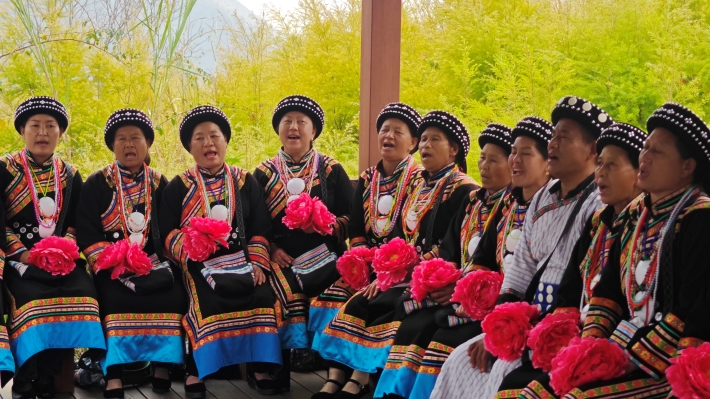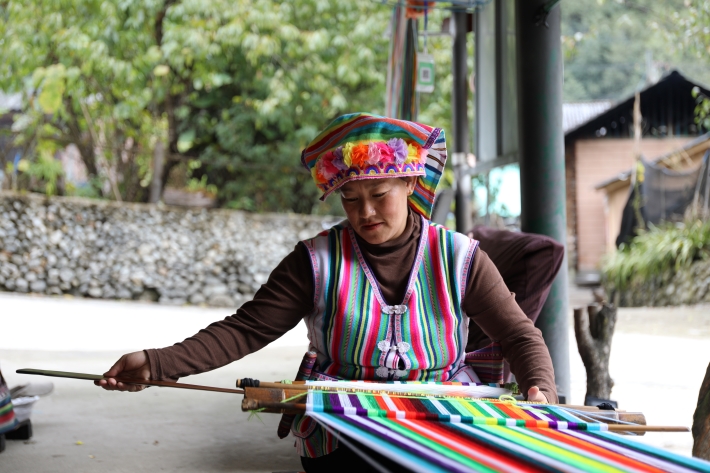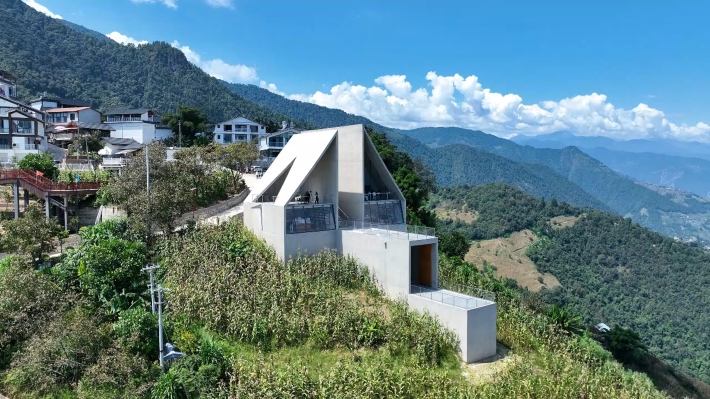|
||||||||||
| Home Top News Economy/Tech Culture/Sports China in Foreign Eyes Green Development Videos Intangible Cultural Heritages |
|
||||||||||
| Home Top News Economy/Tech Culture/Sports China in Foreign Eyes Green Development Videos Intangible Cultural Heritages |
| ChinAfrica |
| Weaving Harmony |
| Nujiang integrates culture and tourism to create new opportunities for development |
| By Xia Yuanyuan | VOL. 17 May 2025 ·2025-05-06 |

Baihualing Farmers’ Choir welcomes visitors in Baihualing Village in Lushui City, Nujiang Lisu Autonomous Prefecture, Yunnan Province, on 30 March (XIA YUANYUAN)
Nestled deep within the Nujiang Grand Canyon, unique ethnic cultures are driving rural revitalisation in Yunnan Province’s Nujiang Lisu Autonomous Prefecture. Relying on its rich intangible cultural heritage, the region integrates agriculture, culture, and tourism to create new opportunities for once-isolated communities.
Melodies of joy
When approaching Baihualing Village in the prefecture’s Lushui City, visitors are greeted by a vibrant sea of mountain flowers and the distant sound of music. Surrounded by forests and accompanied by the rustling of the wind, Jian Wen, the 57-year-old lead singer of the Baihualing Farmers’ Choir, leads his troupe to perform the Lisu people’s unique four-part a cappella singing for tourists.
The four-part harmony is a traditional a cappella style developed by the Lisu people over centuries of agricultural life. Often lauded for its intricate harmonies and cultural depth, it is sometimes referred to as “heavenly music.”
Once primarily performed during traditional Lisu festivals and ceremonies, the cultural value and tourism potential of this musical form are now recognised. Local authorities have implemented measures to protect and promote this unique heritage.
Baihualing, once a quiet farming village, has transformed into a popular destination for visitors seeking authentic ethnic cultural experiences. Visitors can enjoy authentic performances, which have boosted local tourism and provided tangible economic benefits. Many villagers now earn money from participating in the choir.
Yin Guoxu, deputy director of the Nujiang Prefecture Culture and Tourism Bureau, said the choir performs 300-400 times annually. “Each participating villager can earn an additional 10,000 yuan (about $1,400) per year,” Yin said, adding that related businesses like dining and accommodation have also flourished, further increasing local incomes.

A Derung woman weaves blanket at home in Dulongjiang Township, Nujiang Lisu Autonomous Prefecture, Yunnan Province (COURTESY)
New prosperity
Dulongjiang Township, bordering Myanmar, is the ancestral home of the Derung (also spelled as Dulong) ethnic group. Here, another cultural treasure - the intricate technique of weaving Derung blankets - is finding new life through industrial development.
These colourful striped blankets were traditionally an essential part of the Derung people’s life, used as clothing by day and quilts by night. Each handmade blanket typically takes over a month to weave. In 2022, the Derung blanket weaving technique was listed as a provincial-level intangible cultural heritage item in Yunnan.
To preserve the craft and connect it with the market, the local government partnered with a Shanghai-based clothing enterprise to establish the Rainbow Courtyard handicraft workshop. This initiative developed new products like shawls, cushions, and handbags, and through systematic training, imparted standardised production skills to Derung women.
The Nujiang Derung Weaving Dream Industry Co. Ltd., established in October 2024 as part of this initiative, provides employment to 110 local women. “Many rural women who previously had no income can now earn over 3,000 yuan ($413) per month working near home,” said Pu Demei, the company manager.
Nujiang has also introduced a “cultural heritage + educational experience” programme, allowing tourists to try weaving and then purchase the blankets. This “takeaway cultural experience” adds value to the products and strengthens cultural identity among visitors and locals alike.

The Librairie Avant Garde bookstore sits on a mountain of Yangpo Village, Lushui City, Nujiang Lisu Autonomous Prefecture, Yunnan Province (COURTESY)
Reading with pleasure
Perched 1,800 metres high in Yangpo, a village in Lushui City, the Librairie Avant-Garde bookstore offers stunning panoramic views of the Nujiang Grand Canyon. Often described as a “bookstore in the clouds,” it provides visitors with books, tranquillity, and a unique connection to nature.
The bookstore, part of a renowned independent chain, holds over 10,000 titles and became a landmark destination soon after opening on 21 September 2024, attracting a large number of visitors every day.
The bookstore’s popularity has spurred the growth of tourism-related businesses in Yangpo. The village has integrated ethnic features with modest renovations to create a vibrant model for rural cultural tourism.
Yangpo shed its poverty status in 2020. In 2023, a project integrating agriculture, culture, and tourism commenced in the prefecture. Since then, the government has channelled significant investment - over $1 million - to help villagers to develop homestays and parking facilities and support infrastructure around the bookstore.
According to Zuo Jianbin, an official from Liuku Town, which administers Yangpo, the village received over 100,000 tourist visits since September 2024, generating revenue of 1.55 million yuan ($215,000).
“The bookstore not only brings a modern cultural atmosphere to the ethnic village but also acts as a key attraction, drawing attention to the Nujiang Grand Canyon and its diverse cultures,” said Nie Sijia, manager of the Librairie Avant-Garde branch.
As one of Nujiang’s first 20 pilot villages for the integration of agriculture, culture, and tourism, Yangpo exemplifies a successful “government guidance + enterprise operation + villager participation” model. This creates a virtuous cycle - the bookstore drives tourism, boosts incomes, and improves the local environment.
| About Us | Contact Us | Advertise with Us | Subscribe |
| Copyright Beijing Review All rights reserved 京ICP备08005356号-5 京公网安备110102005860号 |